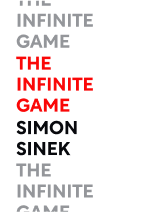

This article is an excerpt from the Shortform book guide to "The Infinite Game" by Simon Sinek. Shortform has the world's best summaries and analyses of books you should be reading.
Like this article? Sign up for a free trial here .
What makes a great leader? What does Simon Sinek say about leadership qualities?
According to Simon Sinek, leadership is so much more than just having authority. True leadership is when you work toward a better future, even if it puts your own career in jeopardy.
In this article, we’ll cover Simon Sinek’s views on leadership as expounded in his 2019 book The Infinite Game.
Infinite Mindset Rule 5: Lead Courageously
Sinek’s fifth and final guideline to follow in developing your infinite mindset is to lead courageously. Sinek notes that when you lead courageously, you might take risks that investors warn against—not just any risks (as finite-minded leaders take risks, too), but specifically, risks that help you follow your Just Cause.
He cautions that it can be difficult to take such risks because they can lower a company’s profitability in the short term, which won’t please investors who want to see immediate shareholder returns or employees who are concerned with their job security. But sometimes risks that decrease immediate profits are the best way to ensure a company’s health in the long run.
Sinek points to an oft-cited example of the convenience store and pharmacy CVS Health, which demonstrated courageous leadership in 2014 when it decided to stop selling cigarettes in an effort to better serve its customers through its Just Cause. CVS’s Just Cause is “Helping people on their path to better health,” and its executives decided that selling cigarettes went against this mission. Wall Street analysts and industry watchers predicted that CVS would lose not only cigarette sales but also ancillary purchase sales made by people buying cigarettes, and that the company would consequently lose market share and profits. CVS’s stock price dropped 7% the day they announced the plan.
However, the dire predictions didn’t pan out. Remarkably, people didn’t switch to buying cigarettes from competitors—instead, they simply stopped buying as many cigarettes. In states where CVS had a large presence, cigarette sales dropped by one percent across all retailers. Further, sales of nicotine patches increased, indicating that CVS’s decision indeed encouraged smokers to quit and therefore promoted the company’s Just Cause of helping people get healthy. Nor did the company experience the financial difficulties that many analysts predicted. Customers and employees supported the move and rewarded the company with good press and loyalty. A year and a half after the plan was announced, CVS’s stock price had doubled.
| In 2019, five years after CVS stopped selling cigarettes, CEO Larry Merlo reflected on how the decision had impacted their business and their strategy. He remarked that the company’s clear and consistent message on improving health gave them a competitive advantage over rival firms, and it paved the way for CVS’s acquisition of health insurer Aetna in 2018. That acquisition will allow them to continue to work toward their ultimate goal of helping people get healthy. Merlo noted that the company’s actions “show that the private sector can have a real impact in addressing the country’s greatest social challenges, without having to sacrifice the pursuit of success.” On an additional note, CVS’s acquisition of Aetna was, in and of itself, demonstrative of the company’s infinite mindset as it was a fundamental pivot that set them on a new path. It evolved from being simply a retail pharmacy to being a central part of its customers’ health. Its Just Cause allowed it to make strong, consistent business decisions even as it changed its practical operations. |
Don’t Fall Into Finite Thinking
Sinek points out that it’s not uncommon for a person or company to veer from their infinite path and start thinking and acting finitely. When that happens, it takes great courage to correct your course and redirect to an infinite path again.
Sometimes a company will lose its infinite mindset when a new CEO takes over and puts the company on a more profit-oriented, short-term-driven path (such as when Jim Keyes took over Blockbuster, as we discussed earlier).
But sometimes a company can lose its way when it gets distracted by its own success. This can happen when a leader starts believing her own hype and thinks she’s solely responsible for the organization’s success. This attitude often leads a leader to pursue fame or wealth while ignoring (or sometimes even opposing) the organization’s Just Cause. Then, that leader will often blame resulting problems that come from this finite-minded attitude on other people and may institute more rigid structures and rules to try to fix things, setting the company on a finite-minded path that’s difficult to correct.
| Success Can Lead to Ego; Ego Leads to Finite Thinking Ryan Holiday discusses this phenomenon in more detail in his book Ego Is the Enemy. He notes that successful leaders become successful because of positive characteristics: They are constantly learning, are open to feedback and criticism, and aim to do something important rather than be someone important. However, once in power, surrounded by people constantly telling them how amazing they are, they often abandon these qualities and instead resist learning new things (convinced of their own wisdom), close off to feedback or criticism (insistent that they can do no wrong), and become more concerned with being someone important rather than doing something important. Holiday doesn’t use the same framework of an infinite mindset as Sinek does, but the recommendations of the two authors align: Essentially, they both advise that a leader put her cause before her own ego. |
Put People Before Profits
According to Simon Sinek, leadership is more than just having authority over your employees. An infinite-minded leader prioritizes the health, safety, and happiness of her customers and employees over the immediate profits of the company, and consequently, the company gets stronger in the long run. This is because when customers feel valued and prioritized, they tend to feel loyal to your company, and when employees feel valued, they are more motivated.
Further, when a company prioritizes the needs of its employees, it’s less likely to run into expensive labor disputes which can not only decrease its profits but can also cost the company public goodwill, translating into lost sales. An infinite-minded leader knows that fostering a culture of collaboration, cooperation, and trust is the best way to build a resilient company.
Sinek describes the practice of prioritizing people as “will before resources.” He defines will as the intangible emotions that employees have regarding your company, like morale, commitment, and engagement. He defines resources as money in all its forms, including profits, cash flow, stock price, and so on.
He argues that all truly successful companies are those who put elements like morale and commitment before elements like profit and revenue, because they end up with a more devoted workforce that more freely gives their time and efforts to the Just Cause of the company.
Importantly, Sinek points out that this does not mean ignoring profits and thinking only of people. The bias toward prioritizing emotions need only be slight—he uses the example of restaurateur Danny Meyer, who famously coined the “51 percent rule,” which meant that when evaluating potential hires, managers weighed 51 percent of their decision on an applicant’s emotional intelligence and 49 percent on their skills.
| Trader Joe’s Found Success Putting People First Other management books have also noted the importance of valuing people over profits. In The Hard Thing About Hard Things, Ben Horowitz advises companies to prioritize in this order: people, products, profits. By “people,” Horowitz specifically means “employees,” but Sinek expands that definition to mean employees, customers, and the wider world—anyone who interacts with the company (like suppliers) as well as the surrounding community. Grocery store Trader Joe’s has made a name for itself by putting people first, and it’s known for valuing both its customers and its employees. The company puts its customers front and center in its mission statement: “We are committed to providing our customers outstanding value in the form of the best quality products at the best everyday prices.” They aim to have their customers think, “Wow! That was enjoyable, and I got a great deal. I look forward to coming back!” As a result of their customer-friendly focus, they have a fiercely loyal customer base and are frequently ranked among stores with the highest customer satisfaction. They are also known for treating their workers well and are consistently ranked among the best places to work by employees. To show they value their employees, they pay them well, allow flexible hours, and offer health care. Because they make employee satisfaction a central part of their strategy, rather than a peripheral part with tacked-on benefits like yoga classes or extra-fun break rooms, they align with Sinek’s theories on the inclusive nature of a Just Cause—they aim to build a trusting team of excited workers dedicated to a mission. Good employee relations coupled with an enthusiastic customer base has allowed the company to do well, consistently opening new stores and leading the industry in sales per square foot. |
Act on Your Just Cause
Sinek emphasizes that to truly lead with an infinite mindset, your Just Cause must be more than merely words; you must act on it. Otherwise, it’s nothing but a marketing slogan. Unfortunately, there are plenty of companies who do this—they adopt a lofty statement of values but do nothing to live up to that statement. For example, both Walgreens and Rite Aid loudly publicize their commitments to health on their websites, but neither has followed CVS’s lead and stopped selling cigarettes.
Sometimes, when a company publicizes a Just Cause but does not live up to it, it defends its actions by pointing to laws that allow its unethical behavior. Sinek uses Rite Aid as an example, relating that when the company was asked if they were planning to stop selling cigarettes, it responded by saying it sells a wide variety of products in accordance with existing law. This attitude essentially hands the responsibility for its own Just Cause to “the system.” Sinek maintains that courageous leaders don’t do this. They hold their companies to higher standards than the minimum requirements of the law.
| It Comes Down to Credibility If your actions match your words, you have credibility. Sinek is not alone in noting the importance of credibility: In the previously mentioned book The Leadership Challenge, Kouzes and Posner maintain that credibility is the foundation of effective leadership and is at the center of trust between an organization and the public. The authors contend that credibility is born of three elements: honesty, competence, and inspiration. If people feel you or your organization tells the truth, is able to live up to that truth, and is working towards a better vision of the future, they are far more likely to trust you, work with you, and give you their business. |

———End of Preview———
Like what you just read? Read the rest of the world's best book summary and analysis of Simon Sinek's "The Infinite Game" at Shortform .
Here's what you'll find in our full The Infinite Game summary :
- Why businesses who see the game as finite don't survive
- How to develop an infinite mindset that will put you and your organization on a path for long-term success
- How the purpose of business is changing






